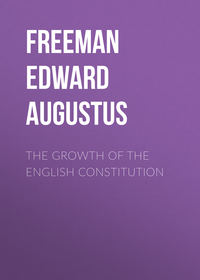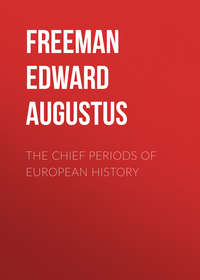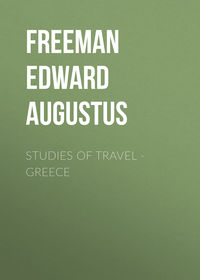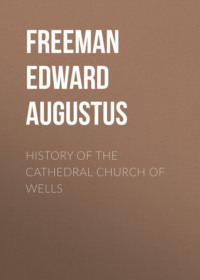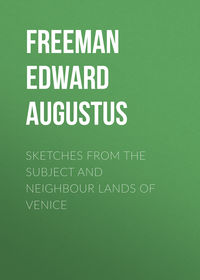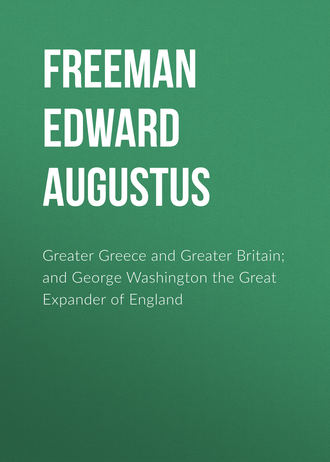 полная версия
полная версияGreater Greece and Greater Britain; and George Washington the Great Expander of England
I believe that nobody proposes anything like this. I feel sure that every colony would at once reject such a scheme. Still such a scheme would be the consistent carrying out of one form of union, and that the most perfect form. But it may be said, We wish to preserve the colonial Parliaments, and at the same time to have members for the colonies in the Imperial Parliament. The question would then arise, the question which arises also in the case of Ireland, Are the colonial members to have votes in the affairs of the United Kingdom? If the Parliaments of the colonies are to remain, while members for the colonies have votes in the Imperial Parliament which, it is to be supposed, is still to settle the affairs of the United Kingdom, one of two results must come. If, while the affairs of the colonies are discussed in their own assemblies, the affairs of the United Kingdom are discussed in an assembly in which the representatives of the colonies have votes, then the mother-country will in truth become dependent on the colonies. The other alternative is that the dormant power of the Imperial Parliament to legislate for the colonies, a power which has never been formally laid aside, will be called into new being whenever it suits the purposes of the members for the United Kingdom. The difficulties and confusions of such a state as this would be endless; so would be those that would follow on the scheme which would doubtless be proposed as their remedy. That would be something like this. As the colonial Parliaments settle the affairs of the colonies, so let the Parliament of the United Kingdom still settle the affairs of the United Kingdom; let the colonial members who are added to it in its “Imperial” character vote only on “Imperial” questions, and leave the affairs of Great Britain and Ireland to be settled by the members for Great Britain and Ireland. But to say nothing of the odd position of men who would be members of Parliament on one division and not members of Parliament on another, how is the distinction to be drawn? Even in a real federal constitution, where the States surrender certain named powers to the federal authority and keep all other powers, questions will arise whether this or that point is of federal or cantonal competence. How much more will such questions arise when it may be asked in almost every case of legislation, Does this matter concern the colonies or not? Would, for instance, such a question as Irish Home Rule, or any change in any direction in the relations between Ireland and Great Britain, be looked on as an “Imperial” question, or as one touching Great Britain and Ireland only6? It is often hard enough to settle rules for assemblies called into being for the first time; but how much harder will it be, when an assembly has had for ages an absolutely boundless range of powers, and where every member has always had an equal voice on all subjects, to bring in a new class of members who shall have votes on certain classes of subjects only, and those classes of subjects which it will be practically impossible to define.
* * * * *But, be any scheme of this kind good or bad, possible or impossible, it is not Federation. We have seen elsewhere what Federation means and how federations grow. A federal union involves a certain loss of power and position on the part of the states which unite to form it. But, as federations have been formed hitherto, that loss of power and position has either been merely nominal or else has been fully made up in other ways. When the Achaian cities, the Swiss cantons, the Batavian provinces, the American States, were threatened by enemies, whom they could resist only by union, it was worth their while to give up the independent power of peace and war; for each city or state to cleave to it would have meant for each city or state to be subdued singly. In some of these cases many of the states had never really exercised the independent powers of peace and war. There was no moment when Aargau or Indiana could have made war on its own account; and, if we say that there was a moment when Massachusetts or Pennsylvania might have done so, it was only an ideal moment which had no real historical being. In each of the great federal unions some of the members, in some of them all the members, distinctly gained in political position by entering the Union. Federation is a check on independence; but many of the states had never known separate independence. But it will be quite another thing to ask a great power, a ruling power, a mighty and ancient kingdom, which has for ages held its place among the foremost nations of the earth, to give up its dominion, to give up its independence, to sink of its own will to the level of a new State or Canton. It will be quite another thing to ask the Parliament of such a kingdom, a Parliament which has for ages been a sovereign assembly, which has for a very long time believed itself to be the first of all assemblies, a Parliament whose range of functions has been boundless, whose will has known no limit save the limits which the laws of nature impose on all wills – to ask such a Parliament as this to come down from its seat, to give up to some other assembly not yet in being the widest and greatest of its powers. In any real federation between the United Kingdom and the colonies, the Parliament of the United Kingdom would be no more than the Legislature of an American state or a Swiss canton; it would have to content itself with those lesser powers which it would not be called upon to surrender, with mere local powers over the mere local affairs of the United Kingdom of Great Britain and Ireland. No voice, direct or indirect, in the great business of the world could be allowed to such a purely local body, any more than it is at this moment allowed to the Legislature of Bern or of New York. We must look things in the face, and this is what we have to look in the face. Perhaps not one man in a thousand who has chattered about “Imperial Federation” has ever stopped to think what “federation” means, any more than he has stopped to think what “empire” means. Most likely he means something quite different from the picture which has just been drawn. Most likely he thinks that Great Britain and the Parliament of Great Britain will somehow become greater by becoming parts of an “Imperial Federation.” All this confusion comes of using words without thinking of their meaning. If by “federation” is meant some wholly new device, something the like of which is not to be found either in the existing world or in any past age of the world, we can better discuss the merits of the new device if it is called by some new name of its own, rather than if it uses old names like “empire” and “federation” in some strange sense. But if by federation is meant a known political system, a system which has existed in the past and which does exist in the present, if is meant such a constitution as once was in Achaia and Lykia, as actually is in Switzerland and America, then we may undoubtedly answer that such a demand was never yet made on any ruling people or any ruling assembly, and that the Parliament and people of Great Britain will assuredly not be the first to set the world the example of accepting it. Every man of us will feel his back set up if we are asked that the Houses of Lords and Commons shall become the Senate and House of Representatives, not of “Greater Britain,” which might haply be promotion, but of a mere canton of Greater Britain, a canton keeping for its Legislature powers somewhat larger, it may be, than those of a Town Council or a Court of Quarter Sessions, but powers as essentially local and secondary in their nature. This or that American or Australian colony may be naturally glad to meet the mother-country half-way; but will the mother-country be equally glad to go and meet them? To rise to the political level of Bern and New York in the existing world7, of Megalopolis and Xanthos in a past world, would be undoubted promotion for Victoria or New Zealand. It would hardly be promotion for Great Britain, for England or Scotland, or for Wales either, to sink to that political level.
Now some votaries of the federal scheme seem to see all this, which its more enthusiastic partisans seem not to have thought of. Such disputants do not argue for the perfect form of Federation, the Bundesstaat, the constitution of Achaia as it was, of Switzerland and America as they are. They would have us fall back on something more like the mere Staatenbund, the type of imperfect Federation which the Seven United Provinces never threw off, but which Switzerland, after a long experience, and the United States after a short one, did throw off in favour of those more perfect forms of Federation which they at present possess. It does not perhaps quite settle the question to say that this would be indeed a step backwards. It might be argued, at least as a specimen of ingenuity in disputation, that such a lax kind of union might possibly suit a confederation whose members lie at vast distances from one another, though it has been proved not to suit confederations whose members lie close together. And then one might argue back again that the physical disunion needed of itself to be, as far as might be, counterbalanced by the closest political union. In a mere Staatenbund all difficulties about the relations of the British Parliament to the new Federal Parliament would be got rid of; for there would be no need of any Federal Parliament. But either the union would have to be so lax as to be really no confederation at all, or else, even in this less perfect union, the British Parliament would still have to give up some of its chiefest and most cherished powers. Instead of a Federal Assembly, there would be a mere congress8 or conference of representatives from each member of the Union, a congress meeting to discuss the foreign affairs of the Union, perhaps with power to settle them, perhaps not. At present the foreign affairs of the kingdom, and of the “empire” too, are settled by the advisers of the Crown, subject to the indirect control of the British Parliament. And in a perfect federation, a Bundesstaat, this indirect system might go on, the indirect control being of course transferred from the British Parliament to the Parliament of the whole “empire.” But in a mere Staatenbund it is hard to see how an indirect control can be brought to bear upon anybody. If the Congress is to have authority to decide in foreign affairs, it must consist of representatives of the several members of the Union. Only then where would be the authority of the Crown and the responsibility of the ministers of the Crown? And with the authority of the Crown, the authority of Parliament, of all the Parliaments, will have vanished also. The only way of giving them, or leaving them, any authority, would be the helpless plan of making the congress merely consultative. It might be a body which should simply recommend measures, and leave them to be approved and carried out by the Legislatures and Executives of the several States, or possibly of some majority of them. This is in theory a possible form of union; but it is not exactly the form most likely to lead to speedy and energetic action, if a confederation scattered over every corner of the globe should be called on to strike a sudden blow for its political being.
In short, if the Bundesstaat is out of the question, the Staatenbund is yet more out of the question. The Bundesstaat is a form of constitution which has worked well in those cases where it has suited the circumstances of the time and place in which it has been introduced. Only it is not suited to the circumstances of Great Britain and her colonies, and it is not likely to work well among them. But it is not too much to say that the Staatenbund has never yet really worked well under any circumstances, and that it is certainly not likely to work well for the first time when applied to circumstances yet more unfavourable than any under which it has hitherto been tried.
* * * * *But these are not the only difficulties about Imperial Federation. To whom is the federation to extend? To all the subjects of the Queen of Great Britain and Ireland? Or only to such of them as are European by dwelling-place or descent? Or, to come nearer to the point, we might put the question thus; Is it to take in only the subjects of the Queen of Great Britain and Ireland, or the subjects of the Empress of India as well? This is a subject of some importance, about which it will be well clearly to know our own meaning. As yet, the doctrine of Imperial Federation is somewhat vague, and its objects are somewhat fluctuating. Sometimes we are told that the Imperial Federation is to be an union of all English-speaking people. The wiser advocates of the scheme see the difficulties, but they seem for the nonce to put them in their pockets. They do not talk either of a federation of all English-speaking people or of a federation of all the Queen’s dominions. They mention those parts of the Queen’s dominions, those parts of the English-speaking people, to which they wish their scheme of federation to extend, and they say nothing about any other parts of either. But this is not to go to the root of the matter, and it is humdrum work compared with the talk of the more enthusiastic votaries of “Imperial Federation.” It is to be the “federation of the Empire,” that is presumably of the whole “Empire;” and in some of the highest flights it would sometimes seem as if the “federation of the Empire,” and the “federation of all English-speaking people” were the same thing. Now about this last there are some other difficulties, of which we may say somewhat presently; at this stage the difficulty is that such a rule would not only shut out a few speakers of European tongues nearer home, it would not only shut out those uncivilized natives of colonial possessions who often save us all trouble by dying out before us, but it would further shut out the vast native population of India, a part of the subjects of the common sovereign of Great Britain and India who must be thought of one way or another. If we are to have a real federation of the Empire, the whole people of the Empire must be let in with full federal rights, as political equals of the Englishman of Britain and the Englishman of Australia. But this would be something very different from a federation of the English-speaking people. Such an enfranchisement as this would indeed be a leap in the dark, a leap such as no people ever took before. It is not for us to say what would be likely to come of it; let us rather ask those who talk about Imperial Federation whether they have thought what would be likely to come of it. Whenever the thing is to talk big about “empire,” its greatness, its “prestige,” all about the dominion on which the sun never sets, all about the drum-roll of the British army going the round of the world, then India is the dearest, the most cherished, the sublimest, part of the talk. “Imperial” interests, “imperial” greatness, “imperial” everything, seem specially at home in that land. It is the specially imperial soil. “Our Eastern Empire,” “our Indian Empire,” is the grandest subject of all for magnificent eloquence. And why? To speak the plain truth, because here the corporate Emperor “We” comes in on the grandest scale. “We” govern India; “we” hold the dominion of Aurungzebe; is not every British elector part of a great corporate Aurungzebe? But receive India to federation, and “we” cease to do all this. In a federation of the “Empire,” “we” must simply sink into the position of citizens of one or more of its states; the elector for London will be in no way privileged above the elector for Masulipatam. It may even be that the “we” shall be turned about, and that people at Masulipatam will begin to say how “we” govern England. Instead of every British elector being part of a corporate Aurungzebe, it may be that every Indian elector shall be part of a corporate William. Imperial Federation may take a shape in which England, Scotland, Canada, Australia, shall be dependencies of the Empire of India. For truly it will need some very artificial arrangement to secure even proportional representation for any of those small and distant cantons, lying so far away from the main centre of power and population. We must expect that in the Federal Assembly, “we,” even strengthened by “our” reinforcements from other English-speaking lands, will be defeated on every division by that vast majority of the people of the Empire who are not English-speaking. “Our” Imperial position will be, in truth, handed over to quite another “we,” a “we” of whom the old British and Jingo “we” will form a very small part indeed.
I shall of course be told that nothing of this kind is meant. And no doubt nothing of this kind is meant by anybody. Only, if so, people should not use words which mean either this or nothing. They should tell us distinctly what they do mean. The words “Imperial Federation,” “Federation of the Empire,” either mean nothing, or they mean that on all “imperial” questions the speakers of English shall be liable to be outvoted by the speakers of Tamul and Telugu. A federation which does not give these last equal federal rights with their European fellow-subjects is not a “Federation of the Empire,” but only of a small part of the “Empire.” Such a federation would be, as regards India, simply an enlargement of the dominant “we,” an admission of more members to “we”-ship and its privileges. The people of India have now for their masters the people of the United Kingdom only. They would then have for their masters the people of the United Kingdom and those of the British colonies also. Such an outcome might be highly imperial, but it would not be at all federal, at least not federal for the vast majority of the inhabitants of the Federal Empire. There would be a grand stroke indeed on behalf of “imperium,” but very little indeed would be done on behalf of “libertas.”
* * * * *In truth, in this particular argument, India, so present to every mind in every other argument, India, the choicest flower of the Empire, the brightest jewel in the Imperial Crown – any other figure of speech that may spring of the oriental richness of an imperial fancy – seems suddenly to be forgotten. But another land seems also to be forgotten, a land which should surely be more to us than all the wonders of the East, a land whose kindred and friendship should surely be more precious to Englishmen than all the glories and all the treasures of a hundred thousand Great Moguls. If it would be a strange Federation of the Empire which should shut out the greater part of the inhabitants of the Empire, it would be a yet stranger Federation of the English-speaking people which should shut out the greater part of the English-speaking people. It is wonderful to see how the declaimers about “Greater Britain” and “Imperial Federation” seem ever and anon perplexed by the fact that there is on the western shore of Ocean, perhaps not a greater Britain, but assuredly a newer England. I believe that no one proposes that the Federation of the English-speaking people shall take in the United States of America; if any one does so propose, I honour him as being at once bolder and more logical than his brethren. But unless such a federation does take in the United States of America, it will assuredly be a very lame and imperfect federation. It is the most curious illustration of the modern theory of colonization, the substitution of mere personal allegiance for nationality in the higher sense, that any mind could take in for a moment the thought of a federation of the English-speaking people of which the United States should not form a part. In the ideas of too many on both sides of Ocean, the fact that the people of the United States are not subjects of the sovereign of the elder England hinders them from being looked at as Englishmen at all. The English of the United States have indeed something to get over. The memories of the War of Independence, the more grievous memories of the war of 1813, have made a sad gap between the two great branches of the same folk between whom, if only modern Europe had colonized on the wise principles of older times, there need never have been any gap at all. That our independent colonies – I use the name as a name of the highest honour – will ever join with us in a political federation is a thing hardly to be thought of. I have often dreamed that something like the Greek συμπολιτεία, a power in the citizens of each country of taking up the citizenship of the other at pleasure, might not be beyond hope; but I have never ventured even to dream of more than that. It is our bad luck at present that there are only two independent English nations, two English nations which parted in anger, and neither of which has quite got over the unpleasant circumstances of the parting. As long as there are only two such English nations, there is almost sure to be somewhat of jealousy, somewhat of rivalry, between the two. And there will always be on both sides people who take a strange pleasure in stirring up ill-feeling among kinsfolk. Surely, if there were three or four or five independent English nations, there would no longer be the same direct rivalry between any two of those nations; there would be far more chance of keeping up friendly feeling, more chance of keeping up, if not the impossible federation, yet something like an abiding political alliance, between all the members of the scattered English folk. The sentiment is possibly unpatriotic, but I cannot help looking on such a lasting friendly union of the English and English-speaking folk as an immeasurably higher object than the maintenance of any so-called British empire. I may judge wrongly; but it strikes me that the establishment of a rival federation, an “imperial” federation, is not the best way to keep up such a friendly union. A single federation, especially a federation which would be an immediate neighbour, would be likely to call out more active jealousies in the United States than are at present called out by the single kingdom and its dependencies. Towards several independent English nations, whatever might be the political constitution of each, feelings of this kind would be likely to be far less strong. We are told that, if we will not have Imperial Federation, we must have either “disintegration” or the continued “subjection” of the still dependent colonies. It is a question which as yet one cannot do more than whisper; but would “disintegration” be too dearly bought, if it carried with it the perfect independence of the United States of Australia, and a greater chance than we now have of keeping the lasting good will of the United States of America?
1
While I am revising my proofs, I read, in a law report in an English newspaper, something about “an American subject.”
2
There are one or two other rather curious uses of the word “imperial” with regard to weights and measures, which it cannot be supposed had any reference to India or the colonies.
3
See an article by Mr. Forster in the Nineteenth Century for February, 1885, from which I have made some extracts.
4
This is historically true of the Achaian cities, of the Swiss cantons (in 1848), and of the original American States. All these really did cede certain powers and keep others. Of the American States admitted since the acceptance of the Federal Constitution by all the original States, it is not historically true, but it is true by a legal fiction. Massachusetts really ceded certain powers to the Union. Missouri never did, as a historical fact; but it did so by a legal fiction when it was admitted to the same rights and the same obligations as Massachusetts.
5
The second union of Greek cities under the headship of Athens comes nearest to such a change; but it is not a real precedent. The cities which formed the second Athenian alliance had once been subjects of Athens; but, when the second alliance was formed, they were subjects of Athens no longer; they entered the union as independent states. And the union was not really a federation, but only a close alliance. Moreover, before very long, Athens was at war with her own allies.
6
When I wrote this a year ago, I did not foresee that the question of Home Rule would become an immediately practical one before the question of Imperial Federation.
7


